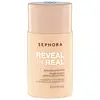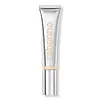Sephora Collection Reveal The Real 12HR Soft Radiant Skin Tint Versus Paco Rabanne Fresh Touch Foundation
What's inside
What's inside
 Key Ingredients
Key Ingredients

 Benefits
Benefits

 Concerns
Concerns

 Ingredients Side-by-side
Ingredients Side-by-side

Water
Skin ConditioningIsododecane
EmollientDimethicone
EmollientCI 77891
Cosmetic ColorantAlcohol Denat.
AntimicrobialBoron Nitride
AbsorbentButylene Glycol
HumectantPEG-10 Dimethicone
Skin ConditioningPhenyl Trimethicone
Skin ConditioningDisteardimonium Hectorite
StabilisingMagnesium Sulfate
Hydroxyacetophenone
AntioxidantCI 77492
Cosmetic ColorantPEG/PPG-18/18 Dimethicone
EmulsifyingDimethiconol
EmollientChlorphenesin
AntimicrobialCI 77491
Cosmetic ColorantTropaeolum Majus Flower/Leaf/Stem Extract
Skin ConditioningTriethoxycaprylylsilane
Tetrasodium Glutamate Diacetate
1,2-Hexanediol
Skin ConditioningCaprylyl Glycol
EmollientCI 77499
Cosmetic ColorantWater, Isododecane, Dimethicone, CI 77891, Alcohol Denat., Boron Nitride, Butylene Glycol, PEG-10 Dimethicone, Phenyl Trimethicone, Disteardimonium Hectorite, Magnesium Sulfate, Hydroxyacetophenone, CI 77492, PEG/PPG-18/18 Dimethicone, Dimethiconol, Chlorphenesin, CI 77491, Tropaeolum Majus Flower/Leaf/Stem Extract, Triethoxycaprylylsilane, Tetrasodium Glutamate Diacetate, 1,2-Hexanediol, Caprylyl Glycol, CI 77499
Water
Skin ConditioningCoco-Caprylate/Caprate
EmollientPolyglyceryl-6 Polyhydroxystearate
EmulsifyingIsododecane
EmollientPolyglyceryl-6 Polyricinoleate
EmulsifyingTrimethylsiloxysilicate
EmollientMagnesium Sulfate
Disteardimonium Hectorite
StabilisingPhenoxyethanol
PreservativeGlycine Soja Oil
EmollientPotassium Sorbate
PreservativeTocopheryl Acetate
AntioxidantPolyglycerin-6
HumectantPersea Gratissima Oil
Skin ConditioningPropylene Carbonate
SolventHydrogenated Vegetable Oil
EmollientC24-28 Alkyl Methicone
EmollientParfum
MaskingPolyglyceryl-3 Diisostearate
EmulsifyingOryza Sativa Extract
AbsorbentOryza Sativa Germ Extract
EmollientXanthan Gum
EmulsifyingTocopherol
AntioxidantAscorbyl Palmitate
AntioxidantAlpha-Isomethyl Ionone
PerfumingLinalool
PerfumingCitronellol
PerfumingLimonene
PerfumingHydroxycitronellal
PerfumingHexyl Cinnamal
PerfumingGeraniol
PerfumingCI 77891
Cosmetic ColorantCI 77491
Cosmetic ColorantCI 77492
Cosmetic ColorantCI 77499
Cosmetic ColorantWater, Coco-Caprylate/Caprate, Polyglyceryl-6 Polyhydroxystearate, Isododecane, Polyglyceryl-6 Polyricinoleate, Trimethylsiloxysilicate, Magnesium Sulfate, Disteardimonium Hectorite, Phenoxyethanol, Glycine Soja Oil, Potassium Sorbate, Tocopheryl Acetate, Polyglycerin-6, Persea Gratissima Oil, Propylene Carbonate, Hydrogenated Vegetable Oil, C24-28 Alkyl Methicone, Parfum, Polyglyceryl-3 Diisostearate, Oryza Sativa Extract, Oryza Sativa Germ Extract, Xanthan Gum, Tocopherol, Ascorbyl Palmitate, Alpha-Isomethyl Ionone, Linalool, Citronellol, Limonene, Hydroxycitronellal, Hexyl Cinnamal, Geraniol, CI 77891, CI 77491, CI 77492, CI 77499
 Reviews
Reviews

Ingredients Explained
These ingredients are found in both products.
Ingredients higher up in an ingredient list are typically present in a larger amount.
Ci 77491 is also hydrated iron III oxide. It's sole purpose is to give a red/pink hue to products.
Iron III oxides are classified as inorganic chemicals for coloring.
Synthetically created Ci 77491 is considered safer than those naturally found. This is because the synthetically created version may contain less impurities. Iron oxides are generally non-toxic and non-allergenic.
Learn more about CI 77491Ci 77492 is also hydrated iron III oxide. It's sole purpose is to give a yellow hue to products.
Iron III oxides are classified as inorganic chemicals for coloring.
Synthetically created Ci 77492 is considered safer than those naturally found. This is because the synthetically created version may contain less impurities. Iron oxides are generally non-toxic and non-allergenic.
Learn more about CI 77492Ci 77499 is also hydrated iron III oxide. It is created from mixing red and black iron oxides. This helps give shades of darkness to a product.
Iron III oxides are classified as inorganic chemicals for coloring.
Ci 77891 is a white pigment from Titanium dioxide. It is naturally found in minerals such as rutile and ilmenite.
It's main function is to add a white color to cosmetics. It can also be mixed with other colors to create different shades.
Ci 77891 is commonly found in sunscreens due to its ability to block UV rays.
Learn more about CI 77891Disteardimonium Hectorite comes from the clay mineral named hectorite. It is used to add thickness to a product.
It can also help stabilize a product by helping to disperse other ingredients.
Hectorite is a rare, white clay mineral.
Learn more about Disteardimonium HectoriteIsododecane is a fragrance, emollient, and solvent.
As an emollient, it helps your skin stay soft and hydrated. Emollients help trap moisture into your skin.
Isododecane's role as a solvent makes it a great texture enhancer. It spreads smoothly on skin and does not leave a sticky feeling behind. Isododecane also helps prevent color transfer in makeup products.
Isododecane is not absorbed into skin.
Learn more about IsododecaneMagnesium Sulfate is a salt. More specifically, it is an epsom salt, or the bath salt used to help relieve muscle aches.
Despite having ‘sulfate’ in the name, it isn’t a surfactant or cleansing agent like sodium lauryl sulfate. Unlike those sulfates, magnesium sulfate doesn’t have the same cleansing or foaming properties (it's simply a type of salt).
In cosmetics, Magnesium Sulfate is used to thicken a product or help dilute other solids. It is a non-reactive and non-irritating ingredient.
One study shows magnesium deficiency may lead to inflammation of the skin. Applying magnesium topically may help reduce inflammation.
You can find this ingredient in sea water or mineral deposits.
Learn more about Magnesium SulfateWater. It's the most common cosmetic ingredient of all. You'll usually see it at the top of ingredient lists, meaning that it makes up the largest part of the product.
So why is it so popular? Water most often acts as a solvent - this means that it helps dissolve other ingredients into the formulation.
You'll also recognize water as that liquid we all need to stay alive. If you see this, drink a glass of water. Stay hydrated!
Learn more about Water